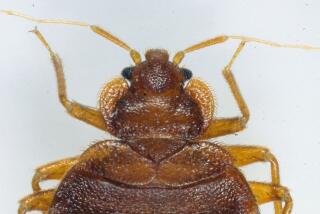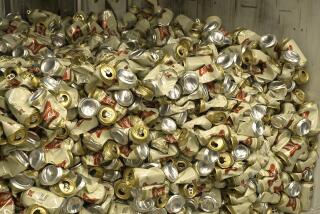Amid Food Scares, Europe Seeks Better Way
- Share via
PARIS — Not since the summer of the mad cows have people in Western Europe worried so much about what they eat--and how to assure its safety.
With France ordering Coca-Cola products off the shelves this week and Belgium reeling from a tainted-feed scandal, French President Jacques Chirac used a meeting here Thursday with President Clinton to call for “a worldwide high scientific council for food safety.”
“Our people are increasingly concerned, worried,” Chirac told a news conference, proposing that the annual summit of the Group of 8--the seven leading industrial democracies and Russia--opening today in Cologne, Germany, create such a scientific council. Chirac said he is seeking “a solution better able to guarantee the health of Europeans--of all of the inhabitants of the world.”
The economic stakes in deciding who should referee issues of food safety are colossal. Two of the most acrimonious transatlantic trade disputes at the moment are over food--hormone-fed beef and genetically modified crops such as corn--that Americans want to sell in the 15-nation European Union but that EU countries say is unsafe or untested.
This week, authorities in France ordered all canned Coca-Cola items--50 million cans worth of Coke, Coke Lite, Sprite and Fanta--pulled off store shelves when at least 200 people fell ill after drinking Coca-Cola products. Total or partial bans on Coca-Cola products also were imposed in Belgium, Luxembourg and the Netherlands.
In Belgium, the use of animal feed tainted with cancer-causing dioxin has led to a ban on the sale of a whole grocery store worth of domestic food products: chicken, eggs, mayonnaise, crepes, cakes and other suspect foods. From as far afield as Moscow, Hong Kong and Saudi Arabia, Belgian chicken breasts and eggs and other European foodstuffs were yanked from markets.
The still mysterious dioxin scandal has become a disaster for Belgian politicians and food exporters alike. Losses in sales have been estimated at $500 million. But since the potentially carcinogenic fats from a plant near Ghent were sold to customers outside Belgium as well, the shock has been felt by agribusiness throughout the European Union and beyond.
In the United States, the Food Safety Inspection Service of the Department of Agriculture has ordered a hold on all imports of EU-produced poultry and pork--fresh, frozen or chilled. A U.S. ban also has been slapped on eggs and products containing eggs--such as macaroni, mayonnaise, bread sticks and pie fillings--from Belgium, France and the Netherlands.
In Southeast Asia, from Thailand to Hong Kong, the sale of imported Gruyere cheese from France, Dutch sausage, Belgian chocolate and a host of other foodstuffs is now forbidden.
The bans serve as a reminder of how tightly intertwined Western Europe’s food-processing industry now is--and, critics would add, how inadequate are the supervisory powers of the EU and its executive arm, the European Commission.
In 1996, European consumers experienced the scare of bovine spongiform encephalopathy, BSE or “mad cow” disease. The virus-like malady, which may cause brain disease in humans, affected British livestock that had been given feed made with offal and other animal products.
Hundreds of thousands of cattle were slaughtered to stop the spread of the disease; but to this day, many Europeans won’t eat British beef, and some won’t eat red meat at all.
After the trauma of “mad cow” disease, some consumer advocates demanded a European counterpart to the U.S. Food and Drug Administration to police often politically influential agribusiness and farm lobbies throughout the European Union. It didn’t happen. Responsibility for food safety was left largely with each EU member country.
In January, either from a leak in the heating system or from tainted oils, dioxin got into some lots of fat that were sold by a Belgian company, Verkest, as a nutrient to be mixed with animal food. The fat was purchased by feed manufacturers in Belgium, the Netherlands and France, who in turn sold their product to countless farms.
It was only at the end of April that Belgium’s agriculture minister, Karel Pinxten, learned of the problem. Authorities did nothing for a month, until a television report broke the news. The government in Brussels then ordered that poultry and eggs be removed from stores.
At the European Union, which is headquartered in Brussels, officials were furious at Belgium’s cover-up and foot-dragging.
“It was a scandal that the information was withheld,” fumed Nick Brown, Britain’s secretary of agriculture. The Belgian government also refused to stop the sale of beef and milk, which the European Commission had demanded.
As of this week, EU institutions were admitting to foreign countries that they still hadn’t nailed down the precise source of the dioxin, and U.S. bans on selected European-produced foods remained in force.
“We haven’t gotten any solid information or data,” a Brussels-based diplomat complained Thursday. “The European Union has 15 sovereign nations and depends on each to implement decisions on food safety. This has shown up the problem.”
Largely due to what his nation’s media called “Chickengate,” Belgian Prime Minister Jean-Luc Dehaene went down to defeat at the hands of voters Sunday. Pinxten and the country’s health minister had resigned earlier, but it wasn’t enough to save their coalition government. In contrast, environmentalist parties did very well, doubling their number of seats in Parliament.
“The dioxin thing comes as a sequence to all those events that have shaken European consumers--Coca-Cola, the beef hormones, GMOs [genetically modified organisms], the British BSE fiasco,” said John Palmer, director of the European Policy Center, a Brussels-based think tank. “We’re witnessing a cultural and societal development with important implications for internal policy and external policy too.”
Palmer predicted that Romano Prodi, incoming president of the European Commission, will quickly be compelled to institute a European equivalent of the FDA. Western Europe in turn will probably dig in its heels even deeper to resist genetically modified food products--what some Europeans call “Frankenstein foods”--from across the Atlantic, he said.
Starting Monday, Coca-Cola products were progressively removed from sale, either partially or completely, in Belgium, Luxembourg, the Netherlands and France. In Spain, 60,000 cans of Coca-Cola products imported from Belgium were impounded, Finnish ferries stopped serving cans from France or the Netherlands, and health inspectors in some German states conducted spot checks of Coca-Cola imports.
The symptoms suffered by the 200 people who reported becoming ill after drinking Coca-Cola products included headaches, dizziness and stomach upset, and some of the stricken people were hospitalized. Coca-Cola officials said the sources of the problems were a substandard type of carbon dioxide gas used at the Antwerp, Belgium, plant to give Coca-Cola products their fizz, and fungicide--used to paint wooden palettes--that apparently got onto some cans at the company’s plant in Dunkirk, France.
M. Douglas Ivester, Coca-Cola’s chairman and chief executive officer, expressed his regrets Wednesday to European consumers.
“This business pleads once again in favor of reinforcing health safety in France and Europe,” French Health Minister Bernard Kouchner told a Paris-based newspaper. “It is necessary, as I’ve already said, to create a health safety agency on the European level.”
More to Read
Sign up for Essential California
The most important California stories and recommendations in your inbox every morning.
You may occasionally receive promotional content from the Los Angeles Times.













